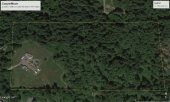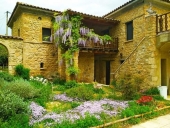Come to our Swale Making Workshop in Tenino, WA, same bioregion, and learn:
Permaculture Design in Earthworks: Swale Making Workshop – Learn Water Harvesting and Retention Techniques – “Slow it, Spread it, Sink it” - Taught by Rick Valley and Pat Rasmussen
2 day hands-on workshop May 30-31, 2015
Camping on site, nutritious meals provided - $250 - $75 15221 Vantine Rd. SE, Tenino, WA 98589 (near Olympia)
To register and request work trades contact Pat at
edibleforestgardens@gmail.com or call 509-669-1549. Paying the full amount will help students and others attend who might not otherwise be able to.
Learn how to design earthworks systems that drought-proof land and optimize productivity. This earthworks course is a hands-on course that will help you design and implement water harvesting and retaining strategies on your property – swales, Fukuoka-style swales, hugelkulturs, and ponds.
Learn the principles of permaculture design in earthworks: reading the site, interpreting contour maps and using surveying tools, placing elements in a design.
*** Reason for earthworks and types of earthworks *** Earthwork elements and types of machines *** How to locate and mark contour lines on your land *** How to use survey equipment; learn practical surveying and design of dams and swales *** How to direct earth movers *** Specifics of dam and pond construction and design *** Integration of swales into a system including planting-up of the system in a food forest
Instructor: Rick Valley
“We will be laying out planting systems which include wise water use. Participants will be involved in the early stages of a broadscale design for a teaching community at a unique site which was once shaped by the southern-most extent of the Puget Lobe of the glacial ice. We'll be looking at how to appropriately work with machines and how to comfortably use hand tools, to shape both the intensively gardened inner zones and the simpler, more extensive outer zones of agroforestry. The project is being well-documented and participants will be introduced to the site assessment process and the development of the design. The weekend will follow a general pattern of designing from pattern to implementing details, so everyone can understand how each element functions in the holistic design. We do not intend to primarily "push" to complete things, but to do things carefully so they will be effective as examples. Likewise explanatory sessions will not be drawn out, but we will use the work sessions to integrate our understanding, and use rest breaks to answer further questions.”
The site:
Heartwood Homestead is a developing permaculture demonstration site and primitive skills and natural building education site for young and old. The 37 acres near Tenino, WA will demonstrate how by using swales, ponds and hugelkulturs we can grow food forests of fruit and nut trees,
berry bushes, perennial vegetables, other crops and aquaponics with water harvested naturally. The non-profit will offer classes, workshops, camping, tours, children’s summer camps, and a natural built ecovillage.
Much of the land was clearcut two years ago prior to the non-profit buying it, so this project will demonstrate how a perennial food system, a forest garden, can restore ecological functions to degraded land
Instructor bios:
Rick Valley - In the 70s Rick Valley lived in a passive solar garage and then helped start a local food garden restaurant on Orcas Island, followed by some years wandering in Latin America learning Spanish and indigenous crops. When homesickness demanded a return to the Northwest, he attended a permaculture workshop at Breitenbush Hotsprings, where he decided to start a bamboo nursery and helped found the PNW Chapter of the American Bamboo Society. At IPC 2 he met Bill Mollison at Evergreen State College and left his carpentry job to take Mollison's PDC on Whidbey Is (1986). From 2004 to 2012 he was land manager at Lost Valley Education Center. Currently he is developing a half-acre suburban forest farm in Eugene and is a partner in a permacultural landscape design & build company, Earthkeeper Landscaping LLC earthkeeperlandscaping.com. Throughout his life he has been planting and building biologically rich and productive systems and teaching the observation and manual skills involved. Facebook www.facebook.com/earthkeeperlandscaping.
Pat Rasmussen – For the past eight years, Pat’s Olympia non-profit “Edible Forest Gardens” www.oly-wa.us/edibleforestgardens has designed and installed more than sixty Edible Forest Gardens of fruit and nut trees, berry bushes and perennial vegetables in private yards, community gardens, schools, businesses and pathways. Each project has offered volunteers the opportunity to learn while doing so they can plant gardens at home, in their neighborhood or anywhere. Pat raises perennial vegetables and berry bushes at Heartwood to plant in local gardens and is active in the Northwest Permaculture Convergence.
Troy Warnick, founder of Heartwood, spent 13 years as a Restoration Ecologist and Hydrogeologist for the WA State Dept. of Ecology. Originating from the midwest on a 140 acre family farm, Troy is a perennial student and teacher of ethnobotany, permaculture, nature observation, ecology, bushcraft, folk skills, green technology and natural building methods. Troy has a BS in Environmental Science from The Evergreen State College and is an Organic Land Care Accredited Practitioner through Oregon Tilth. Facebook – Heartwood Homestead
https://www.facebook.com/HeartwoodHomestead?fref=ts
 1
1




 1
1




 1
1








 1
1




 2
2




 1
1



















